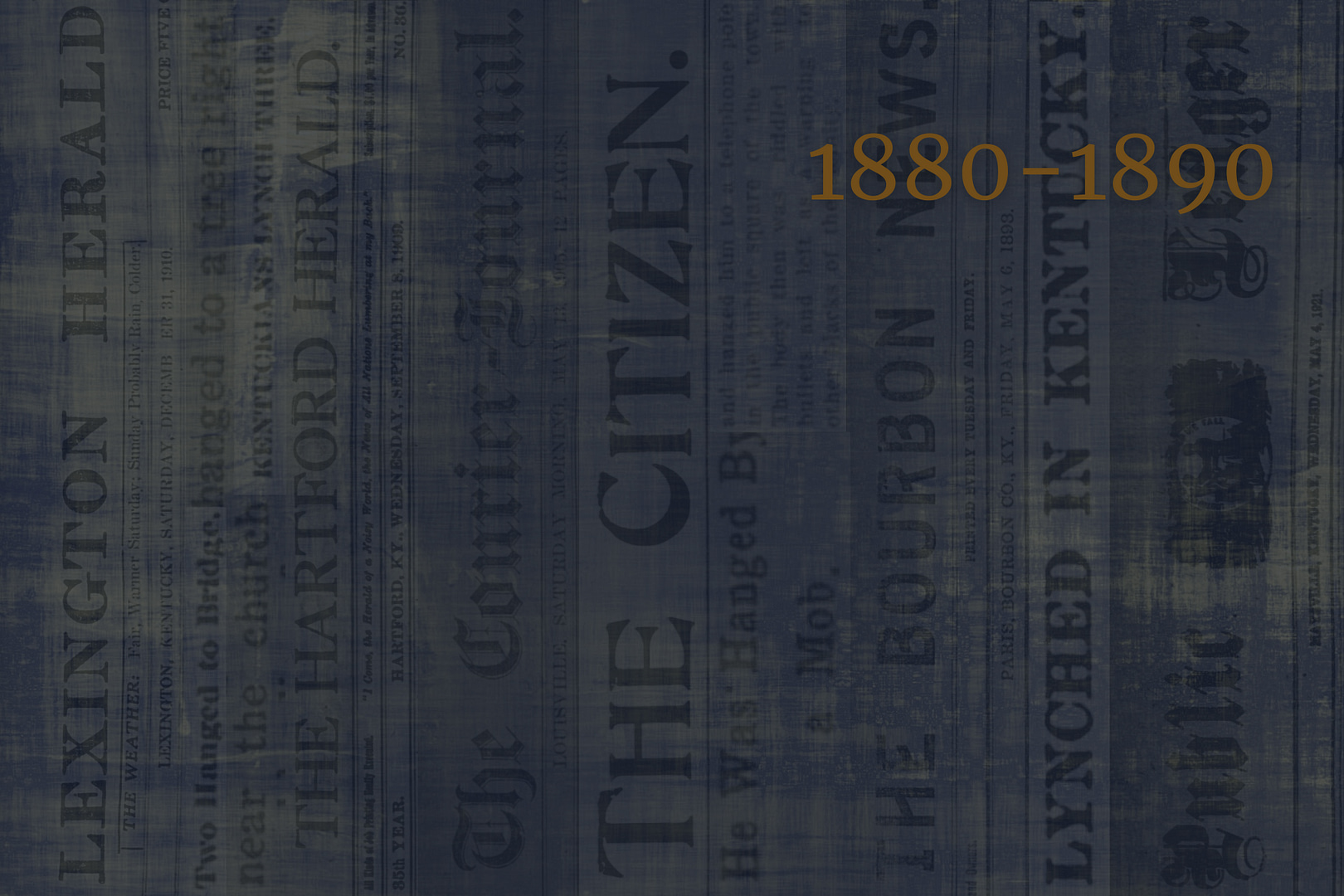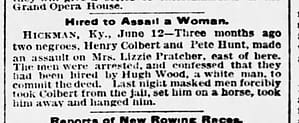
Extant biographical information about Henry Colbert has not been found to date. Newspaper articles identified him as an African American man who worked as a farmhand and lived in Kentucky in 1883.
Despite their racial biases, newspaper accounts of the preceding incident agreed on several facts. The Hickman Courier covered the lynching and proceeding trial. On March 5, 1883 the home of Lizzie Prather, a white woman, was burglarized. She claimed that Henry Colbert and Pete Hurt (also written as Pete Hunt and Pete Hart) were the perpetrators. Prather said she screamed and threatened to shoot the men. The men left.
A few days later, Mose Wilford, a friend of Hurt, told police that Hurt told him about the break-in. Wilford added E.H. Woodall (also known as Hugh Woodall), a white man whose relationship to Prather was not specified, hired Colbert and Hurt to break into Prather’s home, assault her, and steal several items. Pete Hurt fled the county but later returned for trial. Colbert was arrested and awaited his grand jury date in jail.
According to several local news accounts, three months later in the early hours of June 12, 1883, a group of masked men stormed the jail where Colbert was incarcerated. The masked men forced the jailer to let them in and to hand over the keys to Colbert’s cell. The Hickman Courier printed the alleged verbal exchange between the masked men and the jailer: “They had no prisoners but were determined to have one” and that the one they wanted was Henry Colbert. One of the masked men threw a noose over Henry Colbert’s head.
There were several conflicting accounts of Colbert’s fate. After Henry Colbert was reportedly seen with the noose around his neck being led out of the jail, no one saw him alive again. The Hickman Courier reported that Henry Colbert was presumed to have been hanged. The Boston Globe and Buffalo Commercial stated that Colbert was hanged. The Hickman Courier also said that Henry Colbert’s body was found in a river located a couple of miles away, with a bullet hole in the head and the breast, as witnessed by several citizens who claimed to have seen Colbert’s body.
On June 29, 1883, Hugh Woodall and Pete Hunt were arrested for conspiracy to assault Lizzie Prather. At the grand jury proceedings, Pete Hunt confessed at his trial but added that Woodhall forced him and Colber to comply, at one point threatening them both with a gun. The judge of the grand jury ordered both men to stand trial for the attempted assault. Woodall was bonded out for $1000, while Hunt stayed in jail, unable to pay $300 bond. A full accounting of the grand jury proceedings is available in the Hickman Courier’s June 29, 1883 article in the carousel below. In 1884, charges against Woodall were dismissed, and Hart was jailed for four years for perjury.
No one was arrested or apprehended for the lynching of Henry Colbert.
In the newspaper accounts, racial bias was prominent in the various descriptions of Prather, Colbert, and Hurt. To drum up sympathy for Lizzie Prather among its white readership, the Hickman Courier referred to her as “one of the purest hearted ladies in the county.” The same newspaper described Colbert and Hurt as “dastardly fiends,” and the Louisville Courier-Journal described Colbert as a “would-be rapist.” No description of the white man who allegedly hired Colbert and Hurt was offered.
References
- “The Mob Takes Henry Colbert From Jail,” The Hickman Courier, June 15, 1883. Chronicling America: Historic American Newspapers, Library of Congress.
- “The body of Henry Colbert…,” The Hickman Courier, June 22, 1883. Chronicling America: Historic American Newspapers, Library of Congress.
- “The Trial of Henry Colbert,” The Hickman Courier, June 15, 1883. Chronicling America: Historic American Newspapers, Library of Congress.
- “Masked Mob Takes A Would-Be Negro Rapist From The Jail, And Hangs Him, It Is Supposed,” The Courier-Journal, June 13, 1883. Newspapers.com.
Location of the Lynching
Citation
Roper, Myla. “Henry Colbert.” Documented Biographies. Documenting Racial Violence in Kentucky. May 31, 2023. https://drvk.createuky.net/biographies/henry-colbert/









